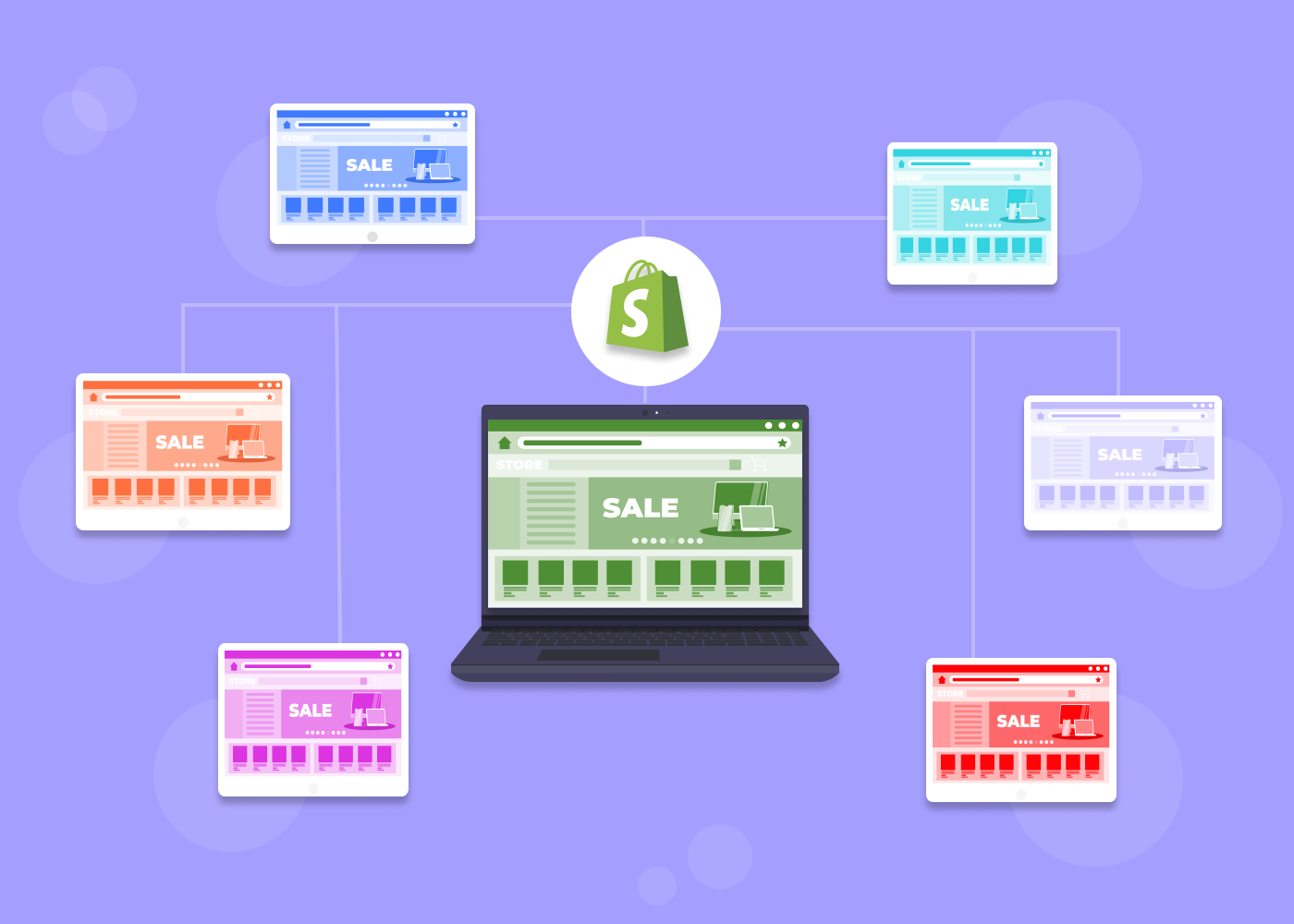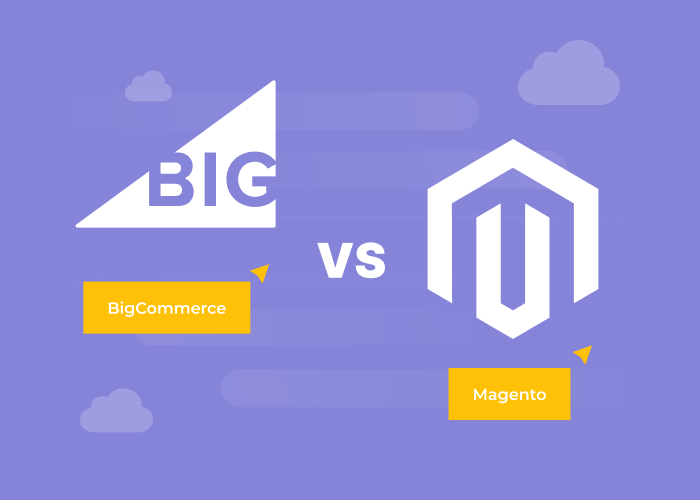Content
E-commerce CRM: Best Solutions to Use Right Now
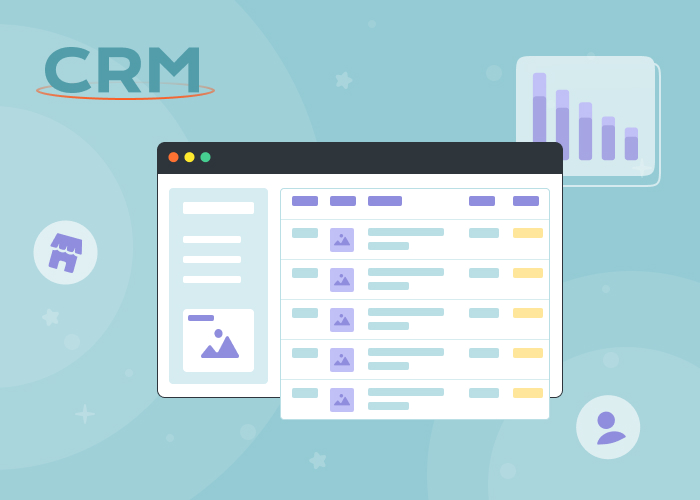
Time to read: 12 minutes
Online promotion is impossible to imagine without CRM - specialized customer relationship management software. Using e-commerce CRM makes it possible to automate sales, but at the same time not lose direct contact with customers. Let’s take a look at some of the best CRMs for the retail industry you can employ right now.
Why Employ E-commerce CRM in the First Place?
Before moving on to an overview of the best solutions, let’s answer the question - “what is CRM e-commerce and what purpose are they used for in the e-commerce industry”?
As we mentioned above, CRM is software that helps develop customer relationships. With its help you can:
- Collect data about the target audience;
- Store information about each specific customer;
- Use tools for the establishment of firm relations.
Don’t confuse CRM with ERP, though.
Lets talk about itHave a project in mind?
CRM-collected data represents the behavior of buyers and their personal traits. Their analysis makes it possible to create scenarios for the target audience as a whole and each buyer individually, develop the most effective methods of promotion and sales to attract more buyers. On top of that, CRM makes it possible to:
- Automate workflows. This will shorten the time for customers to make purchases and help eliminate the possibility of error.
- Analyze purchasing behavior. It can help you identify the products or services with the highest value for your customers and increase the average order volume.
- Segment your target audience. Statistical data about customers obtained using CRM make it possible to determine groups of buyers according to a specific criterion - for instance, by age, gender, region, etc. This will help develop more productive promotion strategies for each customer category.
- Make your sales strategy more personalized. CRM tools make it possible to establish preferred methods of communication with each customer and increase the number of responses.
- Plan a sales campaign. The collected data on the number of customers who visited the store, their chosen product will help to manage the inventory of products in accordance with the preferences of the customers.
- Analyze payment trends. Data analysis includes information about the most frequently used sources of income, valuable customers, the time of the greatest buying activity, and so on.
- Promote products and services using social media. This sales channel is becoming more and more popular, and CRM helps to establish a direct connection with consumers on social media and build brand loyalty there.
With a variety of out-of-the-box tools and whatnot, customer relationship development software enables you to automate sales processes, establish direct communication with customers and expand your target audience. If you are still wondering if your store needs CRM, then think about how many customers you are already losing without it. Read more on the topic in our blog post on the key advantages of CRM for e-commerce businesses.
How to Choose a CRM for Your Company
The e-commerce software market is gaining momentum. According to economists' forecasts, its global turnover will amount to 80 billion dollars by 2025.
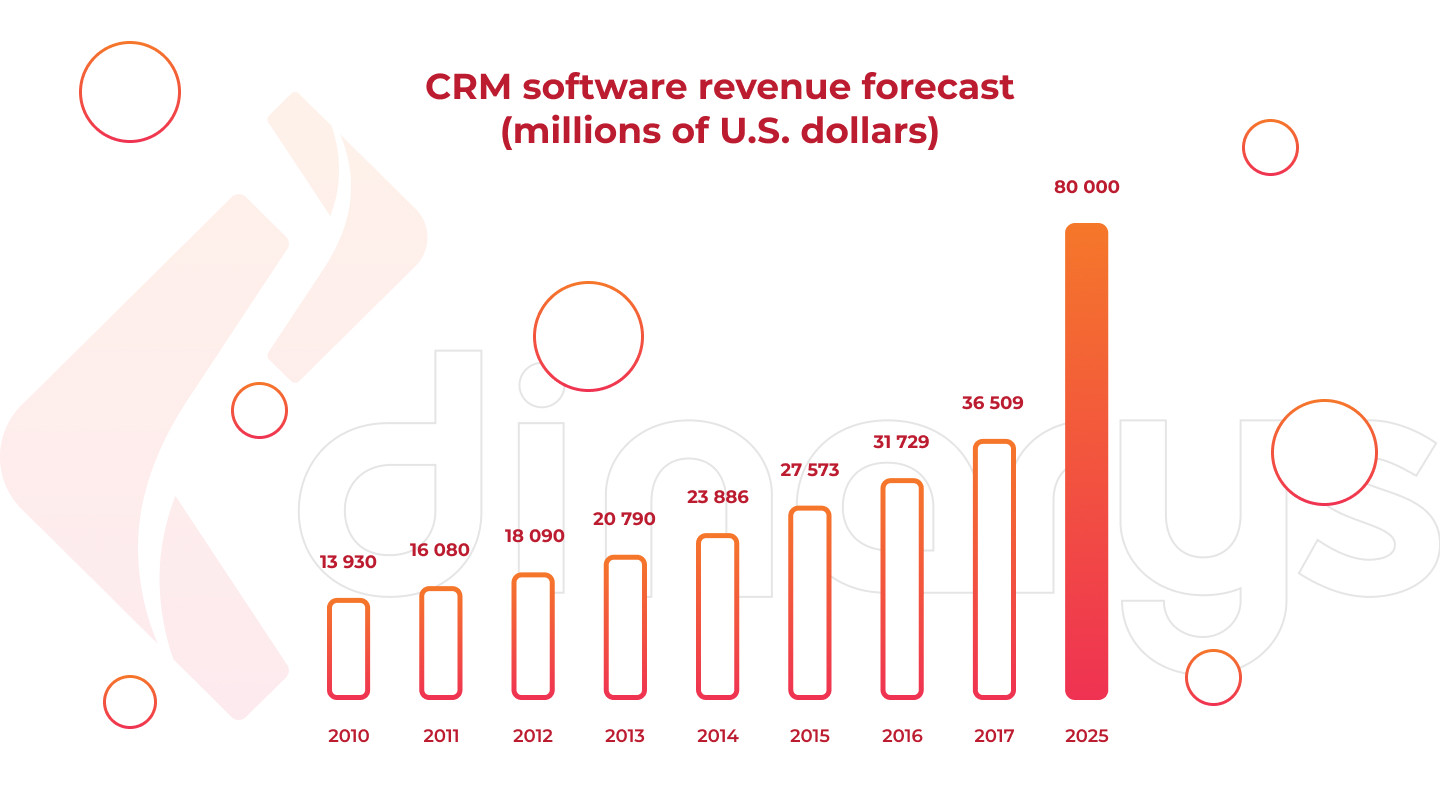
Due to a large number of offers, choosing CRM for retail business at first glance is rather difficult, especially for a person who isn’t specialized in this area. Before choosing a specific software piece, you need to clarify a few questions that will help you decide on the best option for yourself.
- Define the purpose of using the software. It is important to understand not what you want to get right away from using this or that CRM, but how you see it pushing your online business in the future. For instance, do you want to attract more customers and increase your profits? Or is your goal to improve store performance? With a clear understanding of your development goal, you can clearly define what you expect from choosing one of the e-commerce CRM solutions.
- Learn more about the software functionality. Set a standard set of features that should help you achieve particular purposes. But when making a final choice, ask yourself the question: do I really need all of these features? How can they help expand or improve my business? It is better to carefully study the CRM functionality and analyze how it adapts to the needs of your business.
- Select a supplier company. Before purchasing a CRM for an online store, it is recommended not only to familiarize yourself with the product you want to purchase but also to learn more about the company that offers it. Go to the official site to view successful cases, read reviews - collect as much information as possible about the software and its supplier in order to evaluate its capabilities for your e-commerce business.
- Don't be ashamed or afraid to use demo versions. Even if your chosen CRM provider has extremely positive reviews, do not rush to purchase the product at full cost. The trial version will help you evaluate the capabilities of the software in practice and reduce the number of possible errors in the future.
- Ask about settings and training opportunities for employees. If the installation and use of the retail CRM system requires significant effort from your employees, then all its effectiveness will be reduced to zero. Talk to your vendor about installation, configuration, and training for your team to get the most out of the software.
- Analyze the total cost of the product. This parameter includes not only the price for the purchase and installation of software but also hidden costs that arise in the process of using CRM. Having learned the full cost of the product, you can calculate whether its implementation will be beneficial for business development.
Choosing an e-commerce CRM is a process that requires a serious approach to the solution because CRM tools are needed to automate processes in accordance with the chosen strategy. The choice of this or that software product can directly affect the efficiency of your business and rates of attracting new customers.
Types of CRMs
Before proceeding to the analysis of the features of specific types of CRM, let’s get all the common info out of the way. In the modern e-commerce market, two major types of CRM software are popular:
- SaaS, or so-called "Software as a Service". This is a type of software that is licensed per user and works on a subscription basis. The user can access the main software service through their browser or API while its technical support and hosting are entirely the responsibility of the supplier. When purchasing a CRM of this type, there is no need to train a team or hire developers - you just need to purchase a ready-made product, install it and customize it to your own requirements by installing extensions and integrating with third-party applications. This type includes CRMs such as Zoho, Salesforce, Pipedrive, etc.
- Open-source CRM systems. Such solutions involve the creation of software that is fully adapted to the needs of the customer with the possibility of further modernization. Installing and configuring such CRMs requires the involvement of third-party specialists. Examples of open-source CRMs include HubSpot, OroCRM, Odoo, and others.
Each of these types has its own characteristic features. Thus, CRM of the SaaS format makes it possible to configure and manage sales, marketing, and service through the use of a single service. Its indisputable advantages also include:
- Fast implementation of software in workplaces;
- Reduction of the cost of creating a separate infrastructure;
- Easier service and technical support.
Yet open-source CRM systems also have a number of significant advantages, which include:
- The ability to create truly unique software fully adapted to the needs of a particular type of business;
- More accurate integration and the ability to scale the software in the future;
- High availability - no need to keep track of when a license is required to be renewed.
Experts point out that a standard CRM is different from a CRM designed specifically for e-commerce. Standard software products offer comprehensive solutions for different types of business, which can be used for online sales, too. But they cannot always fully satisfy the needs of an online store, since their functionality is designed for large representatives.
Considering that online stores are, as a rule, representatives of small and medium-sized businesses, CRM for e-commerce should satisfy the needs with few resources. That is why the functionality of such software should be simple, with the ability to track data autonomously, without special installation and use skills.
To choose the best CRM in the market for your particular case, it is necessary not only to study the available functionality and its compliance with the needs of the business. It is also important to calculate the possibilities of software upgrades in the future and the possible costs of their implementation.
Why Is CRM Integration with Third Parties So Important for E-commerce?
For the development of e-commerce solutions, developers use many platforms, such as renowned Magento and Shopware. That’s why it is important that the CRM systems used to automate the sales process and attract customers can be integrated with these platforms.
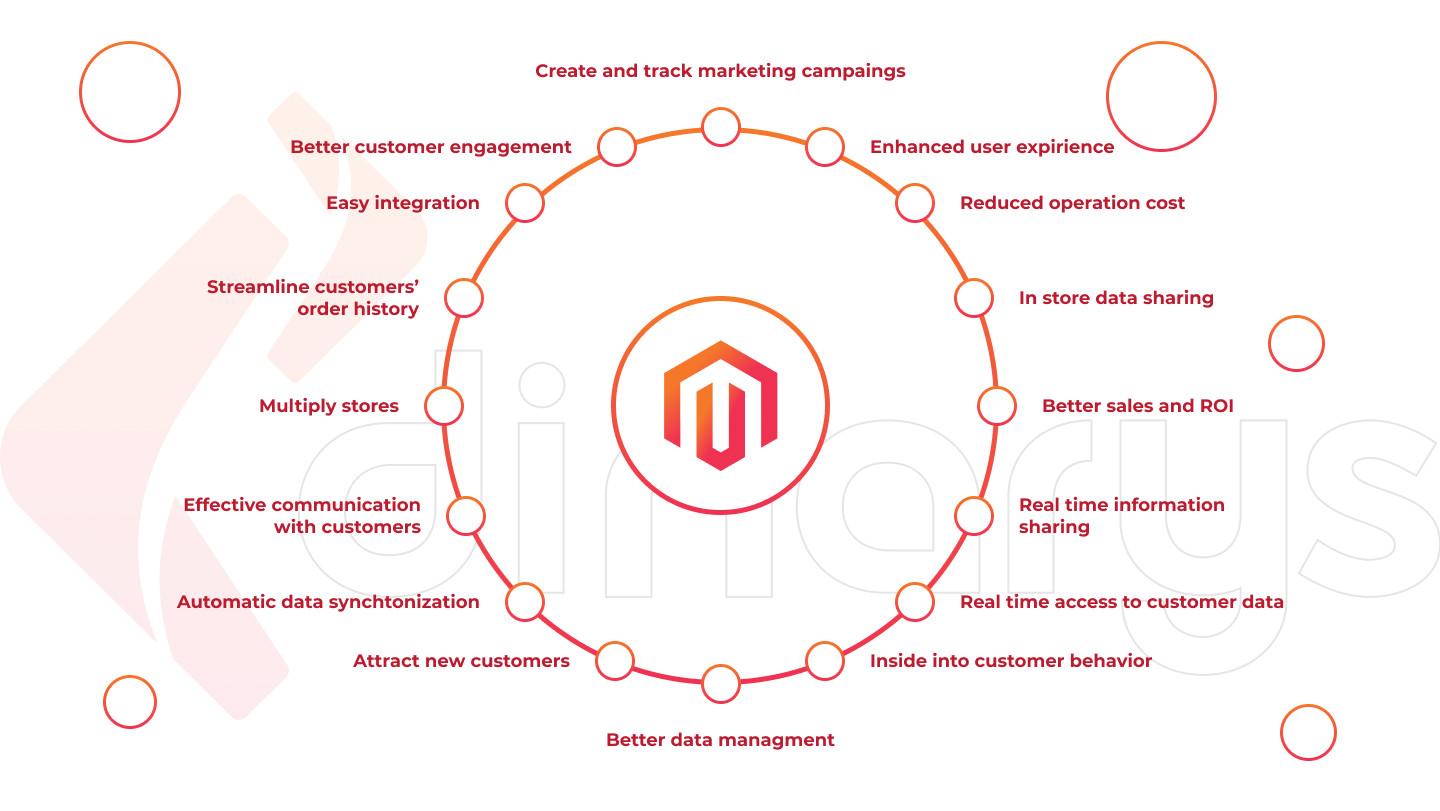
Before moving on to the review of CRMs compatible with Magento or Shopware, it is necessary to say a few words about these platforms. Magento is the most popular e-commerce development platform most commonly used for creating online stores. With its help, you can:
- Create websites based on readymade templates;
- Integrate it with server systems;
- Implement adaptive functionality;
- Gather business intelligence and use the resulting data to develop a marketing campaign.
The Shopware platform is open-source and has the necessary functionality to create an online store from scratch. To create an online store, there is a special web page editor, automatic configuration modules for site optimization, tools for filling the site and managing its features.
In many ways, these platforms are similar, but despite the wide range of tools for sites created with their help, you must also use CRM platforms for data management. Most modern complex systems - including, for example, Zoho CRM, SugarCRM, HubSpot, Freshsales, and others - integrate with Magento by adapting the software to the requirements of the client and their business. We suggest reading our detailed guide on Magento CRM integration.
It is also possible to develop a custom software solution with open-source code, which can be changed depending on requests and promotion tasks.
Lets talk about itHave a project in mind?
Overview of the Best CRMs for Online Business Right Now
We repeatedly mentioned above that the implementation of CRM for online business makes it possible to create a single system space for expanding the client base and creating mutually beneficial partnerships. Dinarys presents to your attention the 10 best CRMs for marketplace or online store management in 2021.
Salesforce
The Salesforce company is considered one of the largest software providers and has been at the forefront since 2015. Salesforce offers a turnkey e-commerce CRM system suitable for small and medium businesses. The main functionality of the software includes:
- Sales forecasts for different periods;
- Document management;
- Customer base and distribution channel management;
- Contract management;
- Email marketing tools.
On top of that, the software easily integrates with external solutions such as Quickbooks for accounting, Slack for interaction between team members, DocuSign for documentation, etc.
The platform also perfectly integrates with big e-commerce development platforms, in particular with Magento and Shopware. Thanks to such integration, it is possible to collect statistical data about customers and group information according to specified criteria to organize it. In the future, this will allow developing more effective promotion campaigns targeted at a specific type of consumer. It will also help you maintain a closer connection with your customers.
Other advantages of Salesforce include ease of use - due to its cloud-based operation, it is quite easy to install and manage while there are also customization opportunities by adding/removing options according to the specific needs, and availability from almost anywhere in the world.
Salesforce remains the market leader for a reason. To start using the solution, you just need to create an account without the need to organize training for team members. The pricing policy is also quite attractive: packages are available both for large business enterprises and for medium to small companies.
Zoho CRM
Zoho is one of the three leaders in the modern market offering the best CRM capabilities for online business. It was originally designed to target small and medium businesses, but today it can be used by almost everyone. With its help, you can configure the options for sales automation, promotion settings, reporting, and forecasting. Zia's artificial intelligence capabilities are also available to users, in particular for integration with other marketing tools such as MailChimp or OneSaaS.
Some users, however, point out the disadvantages of use. The main ones are the limited use of social networks, the lack of customization tools, and the lack of an offline client.
On the flip side, Zoho CRM integrates with Magento and Shopware, providing synchronous storage of customer data between the online store and Zoho records. CRM integration with automatic updates allows you to:
- get data on the history of orders of each customer;
- track results of promotion campaigns;
- monitor the availability of goods, including by category;
- keep accounts and track all financial transactions.
Zoho's tools are always available. The pricing policy of the developer campaign is quite flexible - various packages are available at an acceptable cost.
HubSpot
HubSpot tools enable you to develop customer relationships and streamline core business processes. The main CRM options include:
- Storage for documentation;
- Mobile accessibility;
- Arrangement and management of tasks;
- Automatic data collection;
- Detailed analytics.
The software also makes it possible to set up integration with social networks as marketplaces, communication applications, task schedulers, and other web forms. It can be used not only to customize the sales process but also to track the productivity of the team as a whole. The integration with Magento makes it possible to:
- automate repeat sales;
- use unpaid purchases as an additional incentive to re-attract customers;
- collect information about customers, starting from the moment of creating an account and ending with their browsing history;
- monitor the number of available goods, their movement, and shipment.
The advantage for users is the availability of HubSpot - CRM is completely free, and customers are given the opportunity to try out a trial version.

There are plans available for companies with different income levels, they are quite easily adaptable to the needs of a particular type of activity. The CRM interface is quite easy to use, does not require any special skills or knowledge to install and configure. Therefore, it is considered among the best inexpensive CRM software options out there.
Pipedrive
The functionality of this CRM brings to the table a bunch of benefits, including:
- Ease of installation - the intuitive interface does not require additional knowledge to configure the software in accordance with your needs;
- Ease of planning and monitoring tasks at every stage;
- The ability to import data from other CRMs;
- Automation of basic processes, including tracking transactions.
With the help of this platform, you can manage the product catalog and change the strategy depending on new customer requirements. For more convenient communication with customers, you can use online forms and chatbots with which you can redirect potential customers directly to the sales funnel. The tools can also be accessed through mobile apps.
Pipedrive is quite convenient for more than just communicating with customers. With its help, you can also plan progress for a specified period, collect data on the actual work performed and compare the results with the set goals. This allows you to improve the team's work and quickly fix problems.
At the moment, Pipedrive is considered one of the best ready-to-use CRM options that companies can use regardless of their scale of financial turnover. Before making a purchase, users have the opportunity to order a free trial version of the software with full access to all capabilities.
OROCRM
This solution was originally designed for marketers, sales managers, and customer support professionals. A distinctive feature of OROCRM is its open-source nature, which makes it possible to:
- Manage customer accounts. The platform interface allows you to update and synchronize customer profiles to avoid duplication of data.
- Customize sales dashboards. Thanks to the data collected during actual sales, you can track the effectiveness of the promotion campaign and conversion.
- Collect reporting data on income, sales rates, site conversion, and more.
- Optimize business processes. By integrating CRM with external applications - for example, Google Hangout - you can track contacts, perform tasks, communicate with customers and partners, etc.
At the same time, OROCRM scales quite simply, helps to track the entire cycle of interaction with the target audience, and helps to build promotion campaigns.
Lets talk about itHave a project in mind?
Freshworks
The company provides a comprehensive retail CRM system. By personalizing your account, you can:
- Track sales at every stage;
- Create custom fields to collect and store customer data;
- Set up targeting for the target audience based on the specific parameters;
- Analyze shopping behavior.
On top of that, Freshworks CRM integrates with various external systems for tracking team performance, scheduling tasks, automating marketing campaigns, and more.
For the convenience of users, there is also a free trial and a mobile app for seamless access from anywhere, at any time.
However, some users still highlight the disadvantages of Freshworks CRM, including:
- Insufficiently flexible functionality, including lead segmentation tools;
- Errors in reporting;
- Insufficient technical support.
The Freshworks CRM team strives to fix bugs by constantly updating software and adding new options.
Odoo
Odoo is regularly ranked among the best CRMs for online business with the open-source core. It offers a complex solution for:
- Boosting sales;
- Optimization of basic operations;
- Development of promotion campaigns;
- Service integration;
- Financial management.
The solution has an easy-to-grasp interface. At the same time, the software tools make it possible to collect customer data by analyzing page visits, order history, filling out online forms or messages from customers.

It is also possible to create your own dashboards, track the performance of not only customers but also employees. The system generates reports on the results of the work done in real time, which helps optimize the use of resources in the long run.
The software is also focused on supporting direct communication with the target audience. This makes it possible to predict the volume of sales and customer acquisition, create unique scenarios for each customer, etc.
Agile CRM
Like many other CRM systems, Agile offers an end-to-end solution for users to drive sales, marketing, and service quality. In particular, you get the ability to:
- Manage contacts through the use of one-page control;
- Track all stages of the conclusion of transactions;
- Plan tasks and track their progress;
- Create landing pages using the template builder;
- Set up multichannel advertising mailing;
- Maintain customer feedback;
- Integrate the software with email and social networks.
The Agile retail CRM system is designed to improve customer service and management of key business processes. On top of that, it integrates with the Magento platform to streamline core workflows through your dashboard. Additional benefits of concurrent use are also:
- Full integration with many promotion channels - social media, email, IP-telephony, etc.;
- The ability to conduct cross-channel promotion campaigns;
- Leveraging customer experience to build positive brand loyalty.
Before buying a full version, you can try a trial version of the product, but keep in mind that it is more suitable for small and medium-sized businesses since it has a limit on the number of users.
Lets talk about itHave a project in mind?
Microsoft Dynamics
Microsoft Dynamics is an extensive system of tools for sales management, marketing, customer service, financial accounting. It is most often used by representatives of medium and large businesses. The main advantages of Dynamics CRM e-commerce integration include:
- The ability to integrate with third-party applications;
- Work locally on the device or in the cloud;
- Mobile support and scalability.
Microsoft Dynamics 365 is a package of integrated solutions, each of which can be used together or separately - for example, Dynamics 365 for Sales, Dynamics 365 for Marketing, Dynamics 365 for Customer Service, and others.
Despite a fairly wide number of software applications for users, there are some disadvantages of this CRM:
- Relative high cost of the software. Compared to other CRMs, the price of Microsoft Dynamics is slightly higher, but at the same time, the pricing policy is quite flexible and has no hidden costs.
- The difficulty of use. Certain types of settings - for instance, reports generation - take time to figure out.
Microsoft Dynamics is flexible in adapting to customer needs and is rightly considered among the best e-commerce CRM solutions.
In addition, it contains a significant number of analytical tools. Integration with external systems - like Magento - allows you to develop the most effective sales and promotion scenarios adapted for each client individually.
SugarCRM
SugarCRM is yet another renowned open-source ready-to-use CRM. Users can install it both as a web service and as an installed system. The company offers customers several software applications for users:
- Sugar Market to automate the promotion campaign. It can be used to personalize reach and targeting, as well as predict and report using artificial intelligence.
- Sugar Sell - allows you to automate sales. Helps to track the conclusion of transactions at each stage, as well as the actions of each client.
- Sugar Serve. Application tools allow you to create a single service console to improve the quality of service, as well as create personalized scripts for users.
In addition to sales automation tools, SugarCRM is focused on integrating with external applications - for instance, Asterisk corporate telephony systems. Plus, it works well in combination with Magento tools. As noted by users and developers, SugarCRM has a fairly effective set of tools for communicating with customers.
The functionality of both platforms makes it possible to synchronize data, conduct negotiations and generate reporting information in almost real time.
Bottom Line
The list of presented systems is not really meant to determine what are the most popular CRM systems. It is more about studying the pros and cons of a particular software piece to get a better idea of the product. Only the quality practical use will help determine how well CRM meets the needs of your business.
The CRM software application market offers a wide variety of software applications. In fact, they all offer a suite of sales automation and customer relationship management tools. The choice of one or another CRM system comes down to choosing a tool with features that meet the requirements and needs of your business.
If you are still undecided whether you need a CRM for e-commerce and which one to choose, Dinarys will help you make a perfect choice. We offer only proven e-commerce solutions with the highest value for customers.
Let professionals meet your challenge
Our certified specialists will find the most optimal solution for your business.


